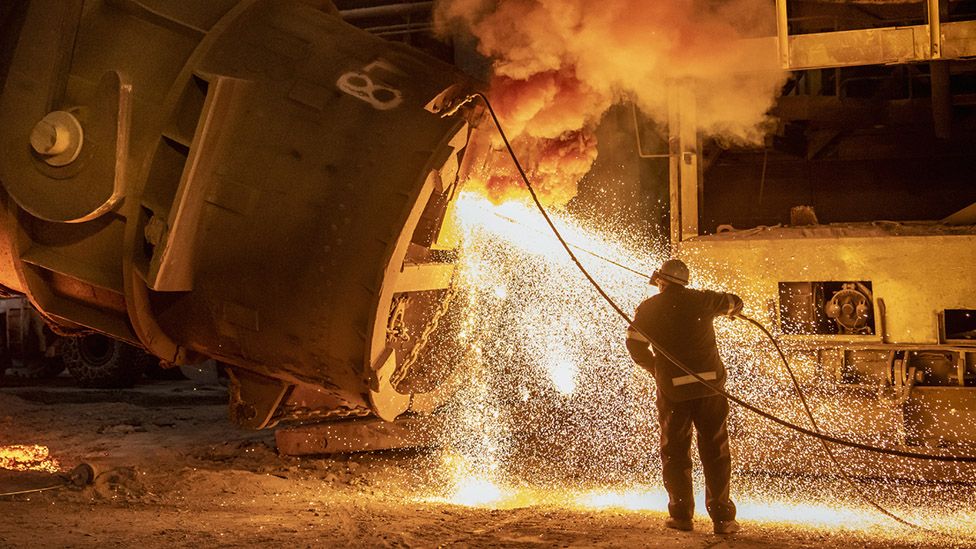Under a significant government support programme, energy bills for UK firms will be reduced by around half this winter from their anticipated level.
In an effort to prevent businesses experiencing skyrocketing costs from going out of business, the programme will stabilize gas and electricity prices for businesses for six months starting on October 1.
According to the administration, hospitals, schools, and charities would also receive assistance.
It follows the announcement by ministers of a £150 billion plan to assist homeowners with their skyrocketing costs for two years.
Industry groups welcomed the package but warned further support may be needed after the winter.
It is understood the scheme will be reviewed after three months with an option to extend support for “vulnerable businesses” – but it is not known what sectors come under the category.
Companies do not need to contact suppliers as the discount will automatically be applied to bills, with savings seen from October but received from November.
Independent analysts Cornwall Insight said the support was “substantial”, representing a 45% discount on wholesale energy prices at the end of last week.
“The support effectively reverts the market back to where it was price-wise in the Spring of 2022,” said Robert Buckley, its head of relationship development.
Prime Minister Liz Truss said the government understood the “huge pressure businesses, charities, and public sector organizations are facing with their energy bills”.
“As we are doing for consumers, our new scheme will keep their energy bills down from October, providing certainty and peace of mind,” she said.
The support will apply to all non-domestic energy customers in England, Scotland and Wales. A parallel scheme, based on the same criteria and offering comparable support, will be established in Northern Ireland.
Officials have not said how much the package will cost the taxpayer, as it will depend on what happens to wholesale market prices between October and April when the support expires.
However, Cornwall Insight estimates the cost at around £25bn.

Energy-intensive industries such as steel manufacturers have raised concerns about their energy costs, which have surged following Russia’s invasion of Ukraine.
Unlike households, businesses are not covered by an energy price cap, which is the maximum amount a supplier can charge per unit of energy. It means non-domestic bills have soared even higher.
On Wednesday, it said new laws would be introduced to ensure landlords passed the discount on to tenants who pay all-inclusive bills.
The government also said it would provide an additional £100 payment to households not able to receive support for their heating costs, such as those not served by the gas grid.
The big problem with this support for business is its shelf life. Few businesses plan with only a six-month time horizon and there will be some whose plans to cut production, close premises, and let staff go will not change as a result of this intervention.
But many others – particularly those in retail and hospitality – may see this as giving them a fighting chance over the commercially crucial Christmas trading period.
The government has thrown an emergency blanket over the economy this winter, but longer-term, more fundamental reform to the energy supply market, its pricing, and mechanics will be needed.
Developing more cheap renewables, securing foreign supplies of liquid gas, drilling for more domestic fossil fuels, breaking the link between gas prices and electricity, and pushing ahead with hydrogen, carbon capture and storage, and small and large-scale nuclear have been part of the government’s plan for nearly two years.
What’s new is the pressure applied by Vladimir Putin to do it as fast as possible.
‘Welcome but more to be done’
Stephen Phipson of Make UK, which represents UK manufacturers, said businesses would “warmly welcome” the government support.
“Government has delivered a scheme which is simple to understand, giving reassurance to the business sector and making immediately available the much-needed help companies have been calling for across the board at a time energy costs were spiraling out of control.”
However, Mr Phipson warned that energy prices were likely to remain high for more than the six-month duration of the scheme and firms may need “support for a longer period if we are to protect jobs and remain competitive”.
Director General of UK Steel, Gareth Stace, said the price cap would give steel makers “the chance to get through the winter”. But he called on the government to “rapidly reform the energy market to ensure longer-term competitive prices beyond the current price”.
Smaller businesses have also been struggling with rising bills, with brewery bosses warning pubs and restaurants across the UK will be forced to close due to energy costs soaring by as much as 300%.
A landlord of one pub in Essex told the BBC his energy bill had risen from about £13,000 a year to £35,000.
Kate Nicholls, chief executive of UKHospitality, said the industry was “relieved” by the support ahead of the busy Christmas trading period.
“The inclusiveness of the support announced today – covering businesses small and large – will be extremely beneficial to the sector… A sector that provides a huge number of jobs, many of which are now more secure.”
